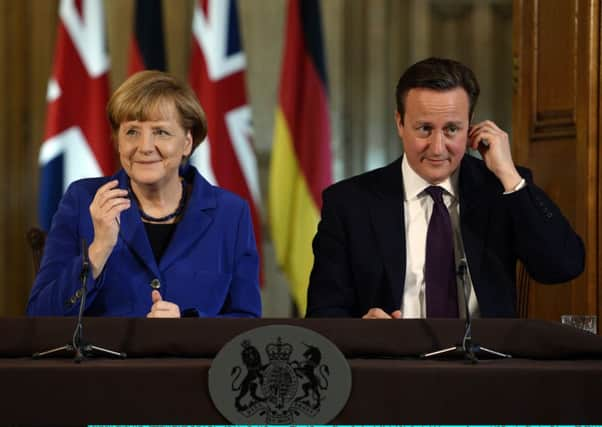Leader: Chancellor offers EU hope to Nationalists


She has proved herself to be a shrewd political operator, careful to keep the struggling partners in the eurozone together while at the same time dispensing tough economic medicine. She is astute enough to avoid giving hostages to fortune and raising false hopes, just as she is sufficiently supple to offer hope for those seeking a modicum of change.
Thus it proved in her carefully crafted speech to both houses of parliament in London yesterday. Prime Minister David Cameron has been desperate to secure the support of the German chancellor in his calls for fundamental changes in the structure and operation of EU institutions.
Advertisement
Hide AdAdvertisement
Hide AdTo placate his deeply sceptical back-benchers he badly needed some indication from Angela Merkel that she was sympathetic to his concerns and that meaningful negotiations for reform could be expected.
He certainly didn’t get that. Germany has not invested decades of political commitment – and substantial net contributions to the EU budget – to sacrifice this on the altar of UK euro-sceptic sensibilities. But neither did she close the doors of some sort of EU reform, Germany itself being anxious to clamp down on “benefit tourism”. She talked of the need for a more competitive EU, suggested that she might be open to some changes on freedom of movement and offered a vague hint of possible treaty change.
Thus, there may be grounds for believing there could be some incremental reform – but little that would suggest a radical shake-up of the type that Mr Cameron needs to present by the time of his mooted 2017 “in or out” referendum date.
What might this mean for Scotland in the event of an independence vote? There is certainly no discernible sign of any retreat from the ambition to create an ever larger EU, nor of the ambition to secure “ever closer union”, principally through currency union and greater integration of monetary and fiscal policy. Indeed, Germany remains a determined champion of greater central oversight and control of member state fiscal policies and banking systems.
But the commitment to some elasticity in the existing arrangements suggests that reform could extend to encompassing an independent Scotland within the EU – indeed, notwithstanding the recent declarations by EU Commission president Jose Manuel Barosso, many on the continent may welcome the idea of a more supportive Scotland as an EU member to counter the scepticism of the rest of the UK.
Mrs Merkel’s speech will almost certainly be interpreted by Nationalists as backing the view of the Scottish Government that an ambitious EU would welcome an independent Scotland in to its fold.
Russia must step back on Ukraine
With every day the ripples from the recent bloody events in Kiev stretch out across the country. The latest flashpoint is Ukraine’s Crimean region where Russia has scrambled fighter jets along its borders, while armed men seized the local parliament and raised the Russian flag.
What makes this all so dangerous? The Crimea is a centre of pro-Russian sentiment – and the immediate worry is that this could spill over into a secession from Ukraine. Crimea, strategically situated on the Black Sea coast, is a virulent stronghold of pro-Russian behaviour. Many of its inhabitants identify themselves as ethnic Russians and speak Russian. They voted heavily for the deposed Viktor Yanukovych in the 2010 presidential election. He is widely seen to have been the victim of an illegal coup. And in this fast-rising political temperature separatist elements in Crimea’s parliament are now pushing for a vote on whether it should leave Ukraine. This in itself could spark a civil war across Ukraine, already struggling under colossal debts and with a stricken economy to contain deep ethnic, religious and political divisions. Some bitter memories stretch back to the Second World War and its aftermath.
Advertisement
Hide AdAdvertisement
Hide AdLittle wonder the presence of Russian soldiers and military equipment along the Crimean border has sparked international concern. Any action that might fuel suspicions of Russian tanks rolling across the border would excite bitter memories of the 1956 Hungarian invasion and lead to a severe escalation of the crisis.
Russia must be persuaded at the very least to stay out of Ukraine’s domestic affairs and if possible to de-escalate its military exercises so close to the border.